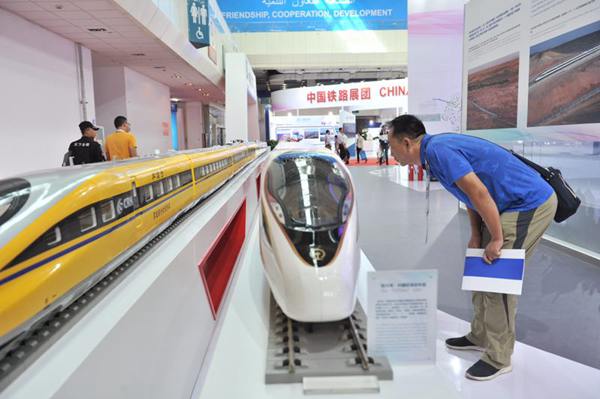


A visitor looks at model trains from the China Railway at the China-Arab States Expo 2017 in Yinchuan on Thursday. Yu Kai/People’s Daily Online
As China gradually rolls out construction plans under the Belt and Road Initiative, an “Online Silk Road” is also under way with the help of Chinese Internet, telecommunication companies.
“We believe the Internet is a basic infrastructure, just like power grids. We also believe that cloud computing is a public service, just like how people need electricity. Resources, both the material and virtual ones, will be the core competitive edge for a country and a society,” Hu Xiaoming, president of Internet giant Alibaba’s cloud computing subsidiary Aliyun, said at the Online Silk Road Conference 2017 on Wednesday.
The conference was part of the China-Arab States Expo 2017 held in Yinchuan, Ningxia Hui Autonomous Region, from September 6 to 9.
The Electronic World Trade Platform (eWTP), proposed by Alibaba’s Jack Ma at the 2016 B20 Summit, has launched its first overseas digital hub in Malaysia and has completed the world’s first e-road, according to Hu.
More digital hubs will be established to cover more trade routes, paving the way for a global “digital silk road,” he added.
“The Belt and Road provides a broader strategic platform for China to further open up to the world. It also creates more opportunities for leading services like Aliyun to better explore the global market,” Hu said.
Telecom company ZTE Corporation is another active pioneer from China, as it is building an advanced information highway for countries along the Belt and Road, a vice president from the company introduced.
ZTE hopes to help transform and upgrade the Arabic telecom operator in the Middle East and North Africa by working together with it for planning and developing telecom infrastructure. This way can ZTE enhance support for Chinese companies to improve their communication capacity and realize interoperability and digital transformation, according to Wei.
Specifically, the company pledged to combine mobile information technology in railway, urban rail, city traffic, aviation, and port for smart transportation.
Seventeen years after entering the Arab market, ZTE has become the main supplier of information and communication technology in the Middle East and North Africa, with the compound annual growth rate at over 20 percent. ZTE has deployed a 3G/4G wireless network, a broadband network, a transmission network, management system maintenance, value add services, and a terminal for MENA telecom operators, such as MTN, Etisalat, ZAIN, Ooredoo, Orange, STC, Sabafon, Algeria Telecom, Algeria Mobile, Algeria OTA, Morocco Telecom, and Libya Telecom.
As a pioneer of smart city construction, ZTE has been involved in the creation of smart cities in 145 cities in more than 40 countries around the world. It also cooperated with Algeria, Egypt, Saudi Arabia, the UAE, and many other Arab governments with the deployment of smart city modules.
“With the implementation of the Belt and Road, ZTE hopes to replicate the successful experience of smart Yinchuan—the world’s leading smart city—to more Arab countries and cities,” Wei said.
Specifically, ZTE helped Yinchuan, the host city of the expo, win a special smart city award at the TMF Conference in France in 2015 with its smart city design and construction.
Meanwhile, Ding Junfa, former deputy head of China Federation of Logistics & Purchasing, noted at the conference that construction of the “Online Silk Road” should remain reliant on a country’s comprehensive transportation system, including logistics hub and information processing. Ding especially warned about cybersecurity, as countries must work to guarantee information confidentiality and product safety.
 Fire brigade in Shanghai holds group wedding
Fire brigade in Shanghai holds group wedding Tourists enjoy ice sculptures in Datan Town, north China
Tourists enjoy ice sculptures in Datan Town, north China Sunset scenery of Dayan Pagoda in Xi'an
Sunset scenery of Dayan Pagoda in Xi'an Tourists have fun at scenic spot in Nanlong Town, NW China
Tourists have fun at scenic spot in Nanlong Town, NW China Harbin attracts tourists by making best use of ice in winter
Harbin attracts tourists by making best use of ice in winter In pics: FIS Alpine Ski Women's World Cup Slalom
In pics: FIS Alpine Ski Women's World Cup Slalom Black-necked cranes rest at reservoir in Lhunzhub County, Lhasa
Black-necked cranes rest at reservoir in Lhunzhub County, Lhasa China's FAST telescope will be available to foreign scientists in April
China's FAST telescope will be available to foreign scientists in April "She power" plays indispensable role in poverty alleviation
"She power" plays indispensable role in poverty alleviation Top 10 world news events of People's Daily in 2020
Top 10 world news events of People's Daily in 2020 Top 10 China news events of People's Daily in 2020
Top 10 China news events of People's Daily in 2020 Top 10 media buzzwords of 2020
Top 10 media buzzwords of 2020 Year-ender:10 major tourism stories of 2020
Year-ender:10 major tourism stories of 2020 No interference in Venezuelan issues
No interference in Venezuelan issues
 Biz prepares for trade spat
Biz prepares for trade spat
 Broadcasting Continent
Broadcasting Continent Australia wins Chinese CEOs as US loses
Australia wins Chinese CEOs as US loses